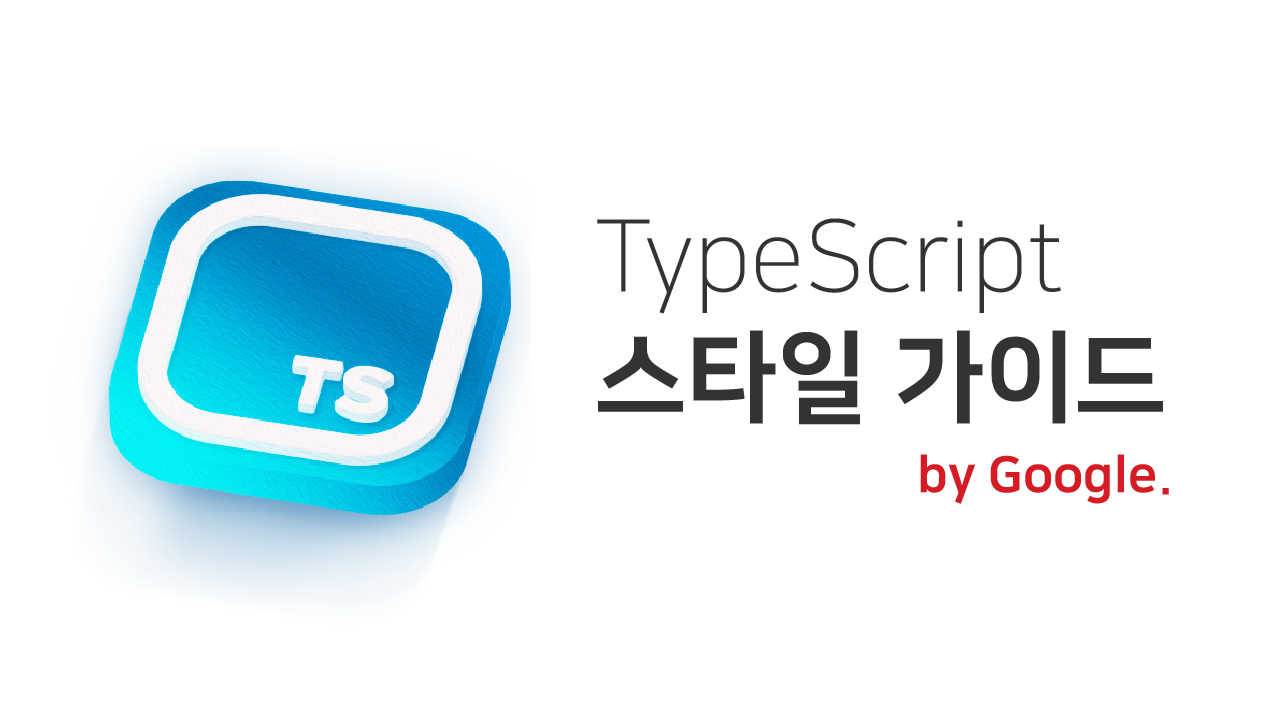
Syntax
Identifiers (식별자)
Identifier는 ASCII 알파벳, 숫자, _(underscore)로만 작성한다.
| Style | Category |
|---|---|
UpperCamelCase | class / interface / type / enum / decorator / type parameters |
lowerCamelCase | variable / parameter / function / method / property / module alias |
CONSTANT_CASE | global constant values, including enum values |
#ident | private identifiers are never used. |
Abbreviations (약어)
약어는 그 자체가 한 단어인 것 처럼 사용한다. 즉, loadHTTPURL 이 아닌 loadHttpUrl의 형태로 사용한다. XMLHttpRequest같은 경우는 제외한다.
$
일반적으로 $는 사용하지 않아야 한다. 그러나 서드파티 프레임워크에 의한 경우는 제외한다.
Type parameters (타입 매개변수)
Array<T> 와 같은 경우는 한개의 대문자(T)나 UpperCamelCase로 작성한다.
Test names
xUnit-style 테스트 프레임워크에서 테스트 메서드이름은 _식별자를 이용해서 구성한다. (testX_whenY_doesZ)
Not use _ as a prefix or suffix.
Imports
Module namespace는 lowerCamelCase로, 파일이름은 snake_case여야 한다.
import * as fooBar from './foo_bar';jQuery에서는 $ 접두사를, Threejs에서는 THREE접두사를 사용한다.
Constants
CONSTANT_CASE는 바꿀 수 없는 값을 의미한다. 만약 바꿀 수 있더라도 바꾸지 말아야 함을 의미한다.
const UNIT_SUFFIXES = {
'milliseconds;': 'ms',
'seconds': 's',
};상수는 클래스의 static readonly 프로퍼티가 될 수도 있다.
class Foo {
private static readonly MY_SPECIAL_NUMBER = 5;
bar() {
return 2 * Foo.MY_SPECIAL_NUMBER;
}
}만약 값이 프로그램이 실행 중일 때, 2번 이상 초기화되거나 유저가 그것을 바꿔야 할 때는 lowerCamelCase를 사용해야 한다.
Aliases
이미 존재하는 심볼에 대한 local scope alias를 생성할 때는, 그 식별자의 포맷을 사용한다. local alias는 이미 있는 이름의 포맷과 같아야만 한다. 변수는 const를 사용하고, 클래스 필드에서는 readonly를 사용한다.
const {Foo} = SomeType;
const CAPACITY = 5;
class Teapot {
readonly BrewStateEnum = BrewStateEnum;
readonly CAPACITY = CAPACITY;
}Naming Style
타입스크립트는 타입으로 정보를 표현하기 때문에, 이름에는 타입에 관한 정보가 들어가면 안된다.
몇가지 구체적인 예를 들자면:
- private 프로퍼티나 메서드의 앞이나 뒤에 _를 붙이지 않는다
- optional parameter에
opt_접두사를 붙이지 않는다. - interface라고 표시하지 않는다. (
IMyInterfaceMyFooInterface - Observable에 접미사
$를 붙이는 건 흔한 컨벤션이며, concrete value와 observable value간의 혼동을 막는데 도움이 된다. 그러나 프로젝트 내에서는 일관되어야 한다.
Descriptive names
이름은 기술적이며 새로운 독자에게 명료해야 한다. 모호하거나 친숙하지 않은 약어는 사용하지 않으며 단어 사이의 알파벳을 지우지 않는다.
- 10줄이하의 범위에서 사용되는 변수나 exported API의 일부가 아닌 변수는 짧은 변수이름을 사용해도 된다.(e.g. 알파벳 한 글자)
File encoding: UTF-8
아스키 문자가 아니라면 실제 유니코드 문자를 사용한다.(e.g. ∞). 출력할 수 없는 문자에 대해서는 16진수나 unicode escapes(e.g. \u221e)를 사용한다.
const units = 'μs';
const output = '\ufeff' + content; // byte order markComments & Documentation
JSDoc vs comments
주석은 두가지 종류가 있다.
- JSDoc (
/** ... */)는 코드의 사용자가 읽어야 하는 주석을 적는다. - non-JSDoc comments (
// ...or/* ... */)는 오직 구현에 관련한 주석을 적는다.
JSDoc은 자바스크립트 스타일을 따른다.
일반적으로 JavaScript style guide's rules for JSDoc의 7.1에서 7.5를 따른다. 나머지 부분은 이 규칙에 대한 예외들을 다룬다.
모든 모듈의 top-level exports를 문서화한다.
/** JSDoc */ 주석을 유저에게 정보를 전달하는 용도로 사용한다. 단순히 property나 parameter의 이름만 보여주는 것이 아니다. reviewer의 판단에 따라 이름과 용도가 명확하지 않은 모든 속성 및 메서드(export, public 여부)를 문서화해야한다.
예외: @NgModule 클래스와 같은 기호에는 설명이 필요하지 않습니다.
TypeScript와 무관한 주석은 생략한다.
예를 들어 type들을 @param이나 @return블럭에 선언하지 않는다. @implements, @enum, @private을 사용하지 않는다.
코드에는 implements, enum, private키워드를 사용한다.
@override를 사용하지 않는다.
주석이 실제로 정보를 제공하도록 한다.
때로는 함수나 parameter의 이름만으로도 충분한 경우가 있다.
- parameter의 이름이나 타입을 단순히 다시 말해주는 주석은 피한다. e.g.
/** @param fooBarService The Bar service for the Foo application. */- 이 규칙에 의해
@param이나@return과 같은 라인은 그들이 실제로 정보를 갖고 있을 때에만 필요하다. 다른 경우에는 생략해야 한다.
/**
* POSTs the request to start coffee brewing.
* @param amountLitres The amount to brew. Must fit the pot size!
*/
brew(amountLitres: number, logger: Logger) {
// ...
}Parameter property comments
parameter property는 클래스가 생성자에게 parameter를 표시하여 필드 및 생성자 매개변수를 단일 선언으로 선언하는 경우이다.
예를 들어 constructor(private readonly foo: Foo)는 클래스에 foo필드가 있음을 선언한다.
이런 필드를 문서화하기 위해 JSDoc의 @param 어노테이션을 사용한다. 에디터는 생성자 호출과 property 접근 시에 이 설명을 보여준다.
/** This class demonstrates how parameter properties are documented. */
class ParamProps {
/**
* @param percolator The percolator used for brewing.
* @param beans The beans to brew.
*/
constructor(
private readonly percolator: Percolator,
private readonly beans: CoffeeBean[]) {}
}/** This class demonstrates how ordinary fields are documented. */
class OrdinaryClass {
/** The bean that will be used in the next call to brew(). */
nextBean: CoffeeBean;
constructor(initialBean: CoffeeBean) {
this.nextBean = initialBean;
}
}함수 호출 시의 주석
필요하다면 호출하는 위치에서 block comment를 이용해서 인라인으로 파라미터를 문서화한다. 또한 객체 리터럴 및 destructuring을 사용한 변수도 고려한다. 주석의 정확한 형식과 위치는 규정되어있지 않다.
// Inline block comments for parameters that'd be hard to understand:
new Percolator().brew(/* amountLitres= */ 5);
// Also consider using named arguments and destructuring parameters (in brew's declaration):
new Percolator().brew({amountLitres: 5});/** An ancient {@link CoffeeBrewer} */
export class Percolator implements CoffeeBrewer {
/**
* Brews coffee.
* @param amountLitres The amount to brew. Must fit the pot size!
*/
brew(amountLitres: number) {
// This implementation creates terrible coffee, but whatever.
// TODO(b/12345): Improve percolator brewing.
}
}JsDoc을 decorator보다 먼저 적는다.
클래스나 매서드가 @Component같은 데코레이터와 JsDoc을 함께 갖고 있다면, JsDoc을 decorator보다 먼저 쓴다.
- 이렇게 하지 말고
@Component({
selector: 'foo',
template: 'bar',
})
/** Component that prints "bar". */
export class FooComponent {}- 이렇게 해라
/** Component that prints "bar". */
@Component({
selector: 'foo',
template: 'bar',
})
export class FooComponent {}
용욱님! 벨로그에서 용욱님 깃헙가는 링크 누르면 Not Found 뜨네요. 업데이트 하셔야 할 것 같습니당.